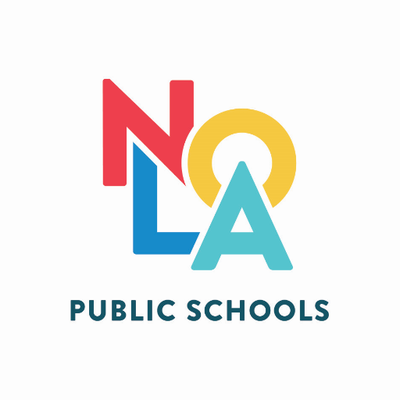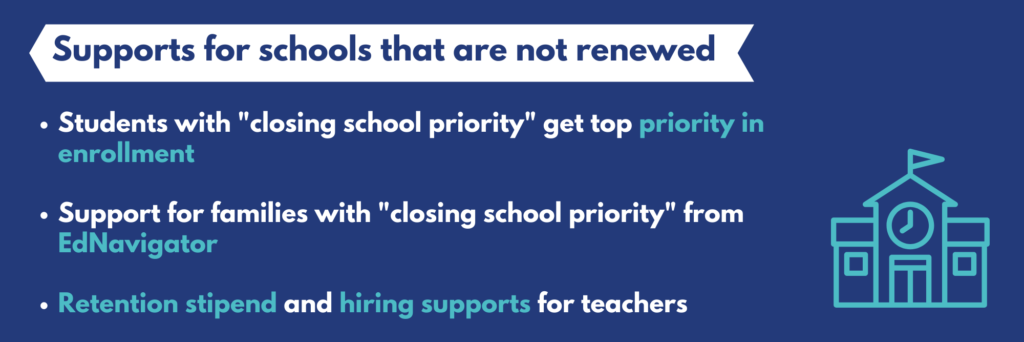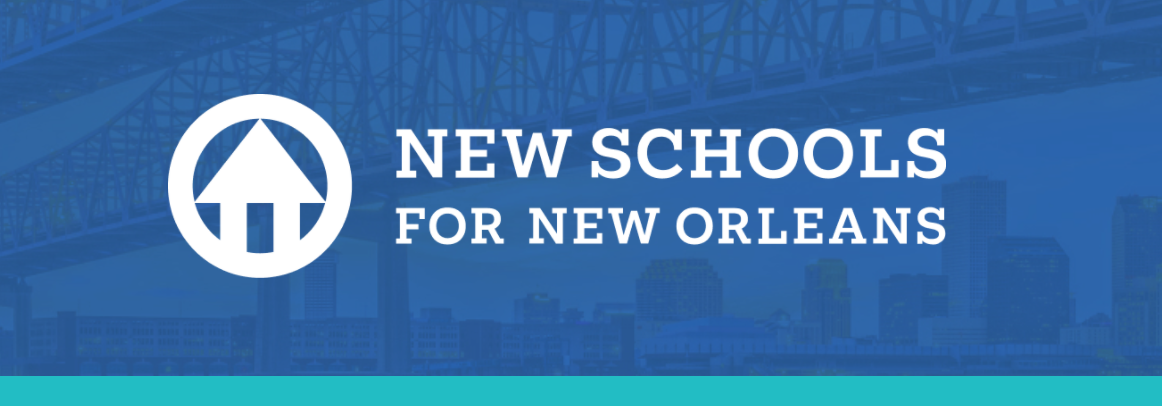A closer look at this year’s renewal process

In New Orleans, all of our public schools are charter schools, which means they are held accountable to a charter, a document that outlines their plans, goals, and the expectations they will meet for their students.
They are managed by nonprofit charter boards, and held accountable to the district, NOLA Public Schools (NOLA-PS), and the Orleans Parish School Board (OPSB).
Though each school has flexibility about their schedule, model, and offerings, public schools in New Orleans are held to shared standards for academics, operations, fiscal responsibility, and key issues like how they support students with disabilities. The district “renews” or “extends” charters on yearly intervals. Charters are initially authorized for four years, and at the end of their third year, can be extended to five years. After that first five years, schools are renewed at routine intervals.
When the superintendent and OPSB are making a renewal or extension decision, they take a close look at the school’s academic performance, including state letter grades and school performance scores. They also determine if the school is upholding their fiscal and operational standards.

Schools are “up for renewal” at intervals between three and ten years, depending on their performance. An “A” rated school showing incredible growth might have a seven or ten year renewal, and a “D” rated school is likely to have a shorter period, as the district and the board want to keep a close eye on its development.
Renewals, extensions, and non-renewals
NOLA-PS communicates with schools around their performance and likelihood of renewal. The district lets a school know if they are on track for renewal or extension, and the superintendent’s team often meets with school leaders, charter management organization leaders, and board chairs to discuss performance.
If a school is consistently failing to meet some of their required standards, or receives an “F” rating on a renewal year, the superintendent will not recommend it for renewal. If the school is not being “transformed” or taken over by another charter operator, this effectively closes the school at the end of the year. At this point, OPSB has the opportunity to veto the superintendent’s decision. While there has sometimes been contentious debate in previous years, this type of veto has never happened. These are always difficult decisions, but the superintendent and OPSB make a promise to the public school parents of New Orleans that they will have high-quality school options for their children. If a school isn’t successfully educating and caring for students, or if it is misusing resources, it is NOLA-PS’ and OPSB’s responsibility to hold those schools accountable and help those students get the education they deserve.
Next steps for families
OPSB and the district recognize that it can be disruptive for students to change schools. Even if their current school isn’t meeting certain standards, there may be aspects of the school that are strong, and the relationships children build there are deeply meaningful.
When a school is not renewed, and a new charter operator is not coming in to lead that school, their students may get “closing school priority” during the enrollment process. This means they have the top priority to any available placement in a school citywide. NSNO offers support to students and teachers in these moments. We fund the nonprofit EdNavigator to work one-on-one with families with closing school priority to find the best school fit for their child. We offer support for teachers and staff at any school that is not renewed, such as a “retention stipend” that incentivizes staying in their role through the end of the year, as well as helping them find a new job in New Orleans schools for the year ahead.

This year, the Superintendent is not renewing two schools’ charters: James M. Singleton Charter School and Arise Academy. Both schools had received an “F” rating from the state, and Singleton faces serious allegations of financial mismanagement. Though their schools are closing, we know that the teachers and teams at both of these schools have been working incredibly hard for students and care deeply about their school communities. We know that students love their teachers, coaches, and school staff, and that they feel connected to and loved by their schools. While it is critically important that schools are held to the highest academic, fiscal, and operational standards, it can be disruptive to students, staff, and families when a school closes. They deserve to learn, work, and send their children to schools that are providing an excellent education. The Singleton and Arise students will be receiving closing school priority for the next school year, making them likely to get one of their top picks of a new school. Their families will receive EdNavigator support and their teachers will receive NSNO’s stipends and hiring support.
***
Though these two schools will be closing, many other schools that were up for extension and renewal will continue on with their strong work for students. They include an alternative school, a school where elementary schoolers learn Latin, a Montessori program, and high schools with strong academic and career-preparation programs. The renewal and extension process allows this diverse, exciting range of schools to flourish in our city, and we look forward to seeing all that their students learn and accomplish in the years to come.
